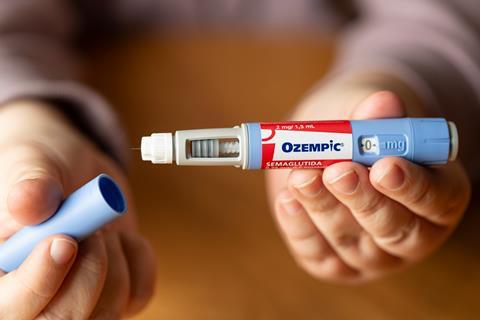A huge uptake in weight loss drugs is reducing demand for calorie-rich snack foods while patients report choosing to eat more fruit and veg

Weight loss jabs are behind many quietly dramatic bodily transformations, both celebrity and every day. But the effect on the food industry is only just being explored.
Data, albeit largely self-reported, has begun to show encouraging results. People taking the drugs, known as GLP-1s or brand names such as Ozempic or Wegovy, not only eat less food (around 500 calories less on average per day, with around 25-30 per cent weight loss), but they are also shifting their food choices.
This means fewer snacks, less calorie-rich food, and less indulgence, while on the flipside, patients report eating more fruit and veg, as well as more dairy and slightly less red meat. This is happening on an increasingly widespread scale, with around 1.5 million people in the UK (four per cent of adults) estimated to be taking the jabs, mostly through private pharmacies or online retailers.
It’s such a significant shift that some experts are calling it a ‘firebreak’ in the junk food cycle – a chance to finally beat the powerful advertising, addictive flavourings and ‘food noise’ that is fuelling the West’s obesity and diet-related health crises.
In the US, where uptake is much more advanced, snack companies are already seeing a downturn in sales. As patents expire and prices come down, the expansion of these drugs could dramatically change the food landscape. It could even ease pressure on land for intensive food production, particularly of ingredient crops destined for processed food, as demand falls.
An astute government would perhaps seize momentum and couple the drug rollout with a campaign to improve longstanding healthy diets. This would be especially prudent given that one of the biggest downsides of the jabs is that, without support for genuine lifestyle and diet changes, people tend to regain all their lost weight within 12-24 months of treatment ending.
Instead, it’s big food manufacturers that are poised to capitalise, launching new lines aimed explicitly at weight loss treatment users – foods fortified with fibre and protein and designed around minimal portion sizes.
The NHS is already poised to roll out use of these drugs to target specific outcomes around diet-related ill health and obesity. More than 100 clinical trials are under way, looking at how the drugs could also impact neurodegenerative diseases like Parkinson’s.
It all feels like a tipping point in food consumption trends, perhaps almost as big as when processed food itself first became mainstream. This time, there are huge potential benefits for both healthy diets and, hopefully, the fruit and veg suppliers behind those diets. Marketers, policymakers and retailers would do well to sit up and take notice.



